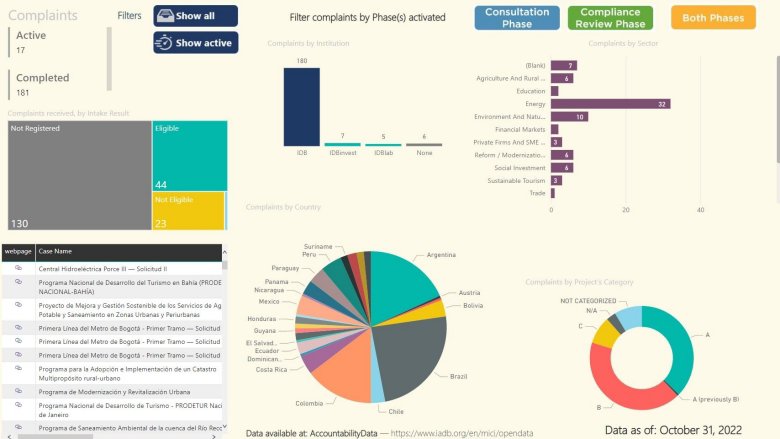How one accountability mechanism made its case data open to the public
By Rabi Thapa
When communities enter a dispute resolution process or a compliance review to seek redress from a multilateral development bank-financed project, they’re demanding accountability. But while the complaints process is a critical first step toward accountability of projects, it doesn’t in itself guarantee it. Transparency of information on the outcomes of the complaints is a key element of that journey.
AccountabilityData provides a clear view of what’s possible in this regard. Run by the Independent Consultation and Investigation Mechanism (MICI) of the Inter-American Development Bank (IDB), this open data portal lists 96 variables on nearly 200 environmental and social claims made regarding IDB Group-financed projects dating back to 2010.
Since the launch of the portal last March, civil society actors, researchers, and complainants have been able to search and filter data on these cases, create custom visualizations, export raw data across multiple formats, and embed the results on their websites.
Esteve Sala, Communications Specialist with MICI and the lead for the open data project behind AccountabilityData, said that publishing as much data as possible on its cases was part of its mission to “make development better.”
“Being accountable means presenting all the data,” he said. “It means making all this information available in the most accessible way possible.” Open data is fundamental to achieving this goal, according to Sala. MICI’s data is open, accessible, usable, comprehensive, and regularly updated, which meets the requirements of the International Open Data Charter. According to the Charter – adopted by 94 national and subnational governments since 2015 – improved governance, citizen engagement, and inclusive development rely on transparency of information.
Samer Araabi, Research Director at Accountability Counsel, called MICI’s data portal “first in class.” Accountability Counsel maintains a database on complaints filed with independent accountability mechanisms (IAMs) across the world, and it currently has information on about 1,600 cases.
“When we set up the Accountability Console, we had to pull the information manually from registries,” Araabi said. “With MICI, uniquely among IAMs, we don’t have to do that anymore. Because of the programming interface, our database can talk directly to their database.”
MICI’s Sala said his organization is happy to share information on how it built the AccountabilityData site, a resource-intensive and time-consuming process. AccountabilityData was able to piggyback on IDB’s open data platform, Numbers for Development, which expedited the process of getting MICI’s data online. But it took years to get the data into order – systematization of data started five years ago, followed by refining, reviewing, correcting, and standardizing.
For those accountability mechanisms that decide to join the open data revolution, however, the MICI project has made one thing clear: There’s a demand for it. In its first 10 months, MICI’s open data portal has had close to 3,000 views and 80 whole dataset downloads.



